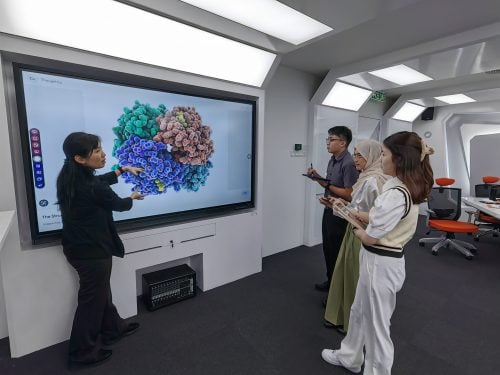Imagine a world where AI-powered chatbots provide 24/7 support to patients, wearable technology monitors chronic conditions in real time, and telemedicine consultations bring specialist care directly to remote areas. This is the future of healthcare, and it is being built with advanced technologies like artificial intelligence, machine learning, big data and analytics, as well as the Internet of Medical Things (IoMT).
Empowered by advanced technologies, healthcare professionals and digital health technologists collaborate to optimise every stage of the healthcare journey. Digital health solutions play a vital role, from preventive care, where individuals can make informed of lifestyle choices to prevent chronic diseases, to disease prevention, early detection, and personalised care. Imagine a future where AI-powered diagnostics empower individuals and healthcare professionals alike. Tailored treatment plans based on individual patient needs and genetic profiles are no longer a dream but a reality within reach.
As the healthcare landscape undergoes a dynamic transformation fuelled by emerging technologies, IMU University’s cutting-edge Bachelor in Digital Health (Hons) programme empowers students to become tech-savvy change agents at the forefront of the digital health revolution.

The Digital Health programme at IMU equips students with the analytical and problem-solving skills necessary to navigate this exciting new era. Through a combination of programming, fundamental computing knowledge, and exposure to the latest digital health trends, graduates gain the ability to derive innovative digital health solutions. They learn to translate data insights into actionable solutions, transforming healthcare delivery.
By the time they graduate, students are prepared to excel as digital health technologists and change agents, ready to make a significant impact by developing and implementing these solutions in real-world healthcare settings.
At IMU’s Digital Health programme, we understand the critical need for a skilled workforce to navigate this digital healthcare revolution. The programme is designed with this in mind, offering a unique blend of theoretical knowledge and practical experience – focusing on project-based learning. Students will not just be memorising facts. The programme emphasises project-based learning, where students will tackle real-world digital health challenges, developing solutions alongside peers.
The Digital Health programme initially felt like a basic IT course, heavy on theory. However, the semester shifted gears with engaging projects and a rewarding programming module with guest speakers from the digital health field providing valuable insights about future career opportunities.
In addition, our faculty goes beyond traditional lectures.

The new Department of Digital Health and Health Informatics in the School of Business and Technology brings in guest speakers – technopreneurs, digital health experts, and medical doctors – who play a vital role in digital transformation in healthcare. They will share their insights and experiences, preparing students for the field’s realities and providing a platform for students to develop the necessary skills and knowledge to advance digital health in Malaysia and beyond.
What Our Students Say
“Despite a knee injury hindering my option to continue with a medical career, my passion for healthcare led me to the Digital Health programme at IMU. The programme exceeded expectations, equipping me with practical skills and the opportunity to network with experts at events like Digital Health Week. This experience solidified my desire for a career in digital health services,” says Balqis, a current first year Digital Health student at IMU.
“While the Digital Health programme kicked off with theory-heavy IT fundamentals, it quickly transitioned into engaging projects and a rewarding programming course that allowed us to apply theoretical concepts through hands-on projects. Guest lectures from digital health experts added another layer – real-world insights into the exciting career paths that lie ahead,” says Elliott, a current first year Digital Health student.
IMU’s modern computer lab caters to the diverse learning styles of today’s students. Its adaptable layout fosters collaboration and hands-on learning, ideal for the modern student who thrives in interactive environments. The lab also transforms how students and lecturers work together, particularly in the Digital Health programme.

IMU’s Bachelor in Digital Health (Honours) programme is the perfect blend of technical and healthcare knowledge. This programme builds a solid foundation in computing, data analysis, and health sciences, preparing students to tackle the challenges and opportunities of the digital health revolution.
The Digital Health programme at IMU is Malaysia’s first undergraduate programme focusing on digital health. The programme aims to equip students with an in-depth understanding and know-how of the healthcare field, particularly in digital health.
Intake
It is a 3-year programme and opens for intake in July and September 2024. Those who join in July will start with the general studies (MPU) modules, followed by the first semester of the Digital Health programme.
Eligibility to Apply
The Digital Health programme is open to students from any discipline with at least a pre-university qualification such as Matriculation or Foundation studies with a minimum CGPA of 2.0 and a credit in Mathematics at SPM level or its equivalent, or a pass in STPM with a minimum Grade C (GP 2.0) in any two subjects and a credit in Mathematics at SPM level or its equivalent. The programme is also open to diploma holders in any discipline, subject to a rigorous internal assessment process.
After the degree
After the 3-year Digital Health undergraduate programme, the students can progress to the Master in Health Informatics and Analytics at IMU or a direct path to further study at Rutgers University, New Jersey, Master in Health Informatics programme. The students will be more focused on linking and analysing large complex datasets, using techniques that transform medical research and create exciting new commercial opportunities in the healthcare sector.









